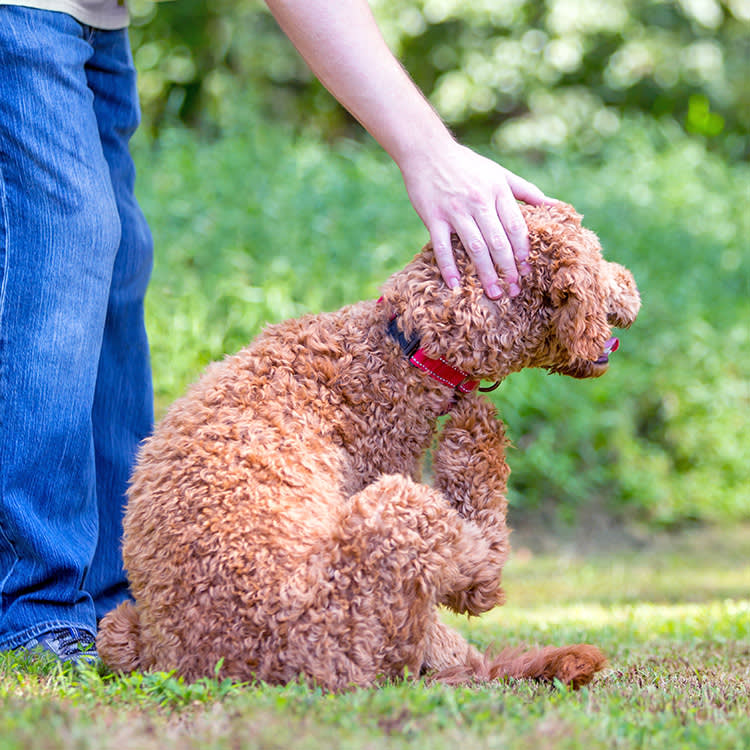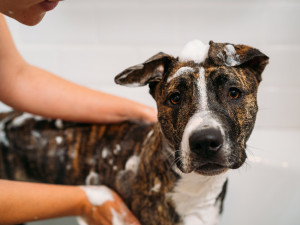3 Reasons Why Your Dog Is Itching So Much
A little bit of itching? Totally normal. However, excessive scratching requires a diagnosis.

Share Article
In This Article:
How Much Itching Is Normal for Dogs? Three Common Reasons Why Your Dog Is Itching So Much Where Do Dogs Scratch, and What Does It Mean? Does Excessive Scratching Mean Your Dog Has a Serious Health Condition? How to Treat Excessive Itching in Dogs How to Prevent Future Itchiness in Dogs
Most dogs scratch from time to time, and that’s normal. But when the scratching, licking, or chewing becomes very frequent, it’s time to figure out what is causing your dog irritation.
Let’s look at the three most common reasons your dog is itching, including treatment and prevention. And while this insight is meant to empower pet parents, it’s important to always consult your veterinarian for both diagnosis and treatment.
Main takeaways
An occasional itch is normal for dogs, but excessive scratching needs attention.
The location on the body where your dog is scratching can give clues about the cause.
The three most common reasons why they’re itching include parasites, skin conditions, and allergies.
How much itching is normal for dogs?
An occasional scratch during the day is normal if it doesn’t involve repeated itching in one area, and if your dog’s skin looks normal. There are times, however, when your dog’s itching will be a cause for concern.

When should I worry about dog scratching?
You should be concerned if your dog scratches themselves several times a day, especially in one area. If the scratching is accompanied by irritation, inflammation, redness, heat, swelling, sores, scabs, oozing lesions, or hair loss — visit your vet. In these cases, you may also see areas of darkened, thickened, or flaky skinopens in new tab.
Three common reasons why your dog is itching so much
There are several different reasons your dog could be itching so much. But there are three that are the most common. The first involves parasites, including fleas. The second is due to skin infections and other skin conditions such as acral lick dermatitis (psychological licking, often from boredom), immune-mediated, hormonal skin conditions, and nutritional and environmental causes. And the third stems from food, seasonal, or contact allergies.
Let’s take a closer look at each of the above.
Fleas and other parasites
Flea-bite allergic dermatitisopens in new tab is the number one cause of itching in dogs. You may think that your dog cannot have that condition because you haven’t seen any fleas. However, it only takes one flea bite in an allergic dog to make them crazy with itching. Other parasites such as mites, the cause of mange, and Cheyletiella (“walking dandruff”) could be the sources of your dog’s distress.
Food and seasonal allergies
A dog can become allergic to an ingredient in their food, even if it’s the same diet they’ve eaten for years. Common food allergens include beef, chicken, lamb, pork, fish, eggs, dairy products, grains, additives, and preservatives.
Seasonal allergiesopens in new tab (often called atopic dermatitis) generally occur during a particular time of the year. The guilty culprits include pollens, mites, and molds. Meanwhile, contact allergies are triggered by contact with irritants or allergens, such as cleaning products and certain plants. This requires direct contact between your dog and the offending substance, which is the location of the reaction.
Dermatitis, skin infections, and other skin conditions
An array of the following skin conditions can also cause canine itching. Skin infections include bacterial, yeast, or fungal infections and hot spots. Immune-mediated diseases include pemphigus and lupus. Hormonal causes include hypothyroidism, Cushing’s disease, Addison’s disease, and diabetes. Nutritional or environmental causes of itching can stem from a lack of essential fatty acids, vitamins, and minerals, as well as dry air, excessive bathing, or harsh shampoos.
Where do dogs scratch, and what does it mean?
You may see your dog scratching all parts of their body, but particular areas can sometimes give you insight into the cause of the itch. While not steadfast rules, these tips can sometimes be helpful.
Ears: If your dog is scratching their ears excessively, this can indicate an infection, ear mites, allergies, or a foreign object in the ears.
Paws: Scratching and licking the paws can mean your dog has allergies, a yeast infection, an injury, a foreign object in the paw, or parasites.
Belly: If your dog spends a lot of time licking their belly, this could be due to allergies, parasites, a yeast or bacterial infection, or a simple heat rash.
Does excessive scratching mean your dog has a serious health condition?
Excessive scratching could mean your dog has a serious health condition. Some of the conditions mentioned — such as pemphigus, lupus, hypothyroidism, Cushing’s disease, diabetes, and Addison’s disease — are serious but very treatable. The most important thing is to detect skin conditions early and see your vet. Early diagnosis leads to the most favorable outcome.
How to treat excessive itching in dogs
Fortunately, most itchy skin conditions are treatable. But sometimes, finding the underlying cause can be difficult and requires some patience and experimentation. If your dog is itchy and you find fleas, this may be as easy as using flea prevention. In other cases, such as serious infections or hormonal skin disease, your dog will need to visit their vet.
Ways to relieve your dog’s itchy skin at home
If you discover that your dog has a skin problem and have caught it early, you may want to try the following home treatments.
Practice brushing, grooming, and keeping their paws clean after outdoor walks.
Try apple cider vinegar (diluted), aloe vera, coconut oil, or colloidal oatmeal paste.
You can also try Benadryl and low-strength hydrocortisone cream. (Talk to a vet first.)
Switch to a hypoallergenic diet.
Give them fish oil supplements.
Try probiotics, which may help.
Frequently vacuum and wash their bedding, and use a flea preventative.
Use an Elizabethan collar (E-collar) or soft recovery cone, if necessary.
You can often manage mild itching at home by combining gentle skin care, dietary adjustments, and environmental control. For more severe or persistent cases, professional veterinary care is essential.
How to prevent future itchiness in dogs
Many items on the home treatment list are identical to ways to prevent future itchiness in your dog. Regular grooming, parasite prevention, environmental cleaning, and investigation into possible allergies are essential. Keeping your dog’s skin and coat healthy with a balanced diet and fish oil supplement can also go a long way to prevent future itchiness. Reduce stress and have your dog seen by your veterinarian for a wellness check as recommended.
Examine your dog’s skin from head to toe regularly, looking for redness, bumps, flakes, or parasites. Follow the above recommendations for preventing hot spots. Treat minor irritations promptly, but see your vet right away if you find anything more than minor.
Bottom line
Occasional scratching is very normal for your dog, but if this becomes excessive and obsessive, then you should be concerned.
If you find something minor, you can treat your dog at home.
However, if the scratching continues, see your veterinarian. Almost all skin problems are treatable, most very easily, especially if caught early.
FAQs
Why is my dog’s scratching worse at night?
Some reasons why itchiness can increase at night include dust mites, mold, or pollen in their bedding, in addition to heating or air conditioning drying out the air in your home. Additionally, fleas are often more active at night. Or your dog may have a medical condition such as atopic dermatitis, yeast infections, or hormonal imbalances like hypothyroidism that can cause chronic itching that worsens at night.
Are some dog breeds more prone to excessive itching than others?
Yes. The following breeds can be more susceptible to the factors that cause excessive itching: Bulldogs (English and French), Labrador and Golden Retrievers, Terriers, Cocker Spaniels, Dalmatians, Boxers, Shar-Peis, Poodles and Poodle Mixes, German Shepherds, Beagles.
Why is my dog itching so much if they don’t have fleas?
There are many other causes of itchiness in dogs than fleas. Allergies, other parasites, medical conditions, skin infections, and dermatitis are just a few of the possible causes.
References
Angus, DVM, DACVD, John C. Top Five Reasons Dogs Itch: An Eight-Week Plan. www.cabidigitallibrary.org/doi/pdf/10.5555/20143185104opens in new tab.
Fadok, DVM, PhD, Diplomate ACVD, Valerie A. Dogs That Itch: Determining the Cause and Stopping the Frenzy. www.cabidigitallibrary.org/doi/pdf/10.5555/20083206621opens in new tab.
Rosales, DVM, DACVD, Millie. Not All Itchy Dogs Are Allergic: Other Pruritic Dermatoses. www.cabidigitallibrary.org/doi/pdf/10.5555/20103181363opens in new tab.

Dr. Shelby Neely, DVM
Dr. Shelby Neely is a freelance writer and veterinarian who graduated from the University of Pennsylvania School of Veterinary Medicine and has practiced veterinary medicine for 30 years, specializing in small animals. Her work has appeared in Allivet, AsktheCatDoctor, WhiskerDocs, Ask the Cat Doctor Radio, Ask the Cat Doctor TV, and numerous other websites, brochures, newsletters, newspapers, and ebooks. In her spare time, Dr. Neely likes to spend time with her three children, two grandchildren, three cats, two grand-cats, and five grand-dogs.
Related articles
![A dog getting a bath]()
How Often Should You Wash Your Dog?
“If your dog is stinky or looks dirty, wash ’em!” Plus more pro tips from LA dog groomer Jess Rona.
![Brown terrier dog scratching its ear outdoors]()
Relief for Your Dog: Discover Effective Solutions for Their Seasonal Allergies
A vet explains why environmental allergies flare up and what to do about it.
![Black puppy itches behind her ear due to flea allergy]()
Shoo, Flea: What to Do About Your Dog’s Disturbing Flea Allergy
Before you say “ewww” Moira Rose-style, learn these steps to prevent and remove fleas.
![puppy scratching fleas, get rid of fleas on dogs]()
How to Get Rid of Fleas — Proven Home Remedies
You can stop your home from becoming a literal flea circus.
Can You See Fleas on Dogs?
Come out, come out wherever you are, you little pests.
![Cute weimaraner dog lying on lawn and scratching its back]()
Best Allergy Medicines That You Can Give to Your Dog
Here’s what works (and what doesn’t).








